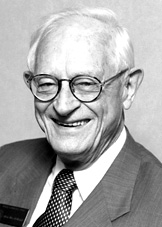- The Nobel Prize in Chemistry 2000
- Hideki Shirakawa, Alan G. MacDiarmid, Alan J. Heeger
-
The Nobel Prize in Chemistry 2000 was awarded jointly to Alan J. Heeger, Alan G. MacDiarmid and Hideki Shirakawa "for the discovery and development of conductive polymers".
We are used to polymers–that is, plastics–being somehow the opposite of metals. They insulate, they do not conduct electricity. Electric wires are coated with polymers to protect them–and us–from short-circuits. Yet Alan J. Heeger, Alan G. MacDiarmid and Hideki Shirakawa have changed this view with their discovery that a polymer, polyacetylene, can be made conductive almost like a metal. Plastics are polymers, molecules that repeat their structure regularly in long chains. Heeger, MacDiarmid and Shirakawa made their seminal findings at the end of the 1970s and have subsequently developed conductive polymers into a research field of great importance for chemists as well as physicists. In the future we will be able to produce transistors and other electronic components consisting of individual molecules - which will dramatically increase the speed and reduce the size of our computers.
The Prize amount, SEK 9 million, will be shared equally among the Laureates.

Hideki Shirakawa
Alan G. MacDiarmid
Alan J. Heeger
-
Health and Chemical more >
-
Hot Products
- 258864-54-9 TRIHEXYL(TETRADECYL)PHOSPHONIUM CHLORIDE
- 123952-70-5 1,5-Diamino-3-methylpentane
- 1187594-09-7 Baricitinib
- 129-44-2 1,5-Diaminoanthraquinone
- 77239-98-6 Bromadol HCL BDPC
- 170851-70-4 Ipamorelin
- 51811-79-1 NONOXYNOL-3 PHOSPHATE
- 2154-66-7 diazobenzenesulfonic acid
- 22246-18-0 3,4-Dihydro-7-hydroxy-2(1H)-quinolinone
- 128-39-2 Phenol,2,6-bis(1,1-dimethylethyl)-
- 174063-87-7 1,4-Bis-[4-(3-acryloyloxypropyloxy)benzoyloxy]-2-methylbenzene
- 1049733-74-5 1-[(2-Chloro-6-fluorophenyl)methyl]-1,4-diazepane dihydrochloride


